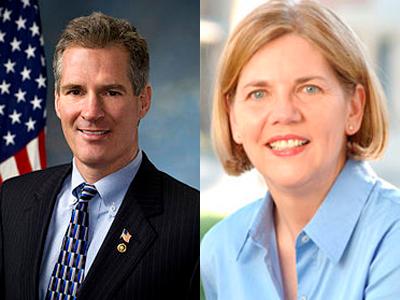Massachusetts Senate candidates call for truce on negative ads
Scott Brown, left, and Elizabeth Warren have agreed to try and keep negative political ads out of their campaign. (Photos from U.S. Congress via Wikimedia Commons.)
In the Republican presidential nominating contest, Super PACs and their attack ads have become a major point of contention.
Up in Massachusetts, though, U.S. Sen. Scott Brown and his likely Democratic challenger, Elizabeth Warren, are agreeing to a bit of a truce before the battle has even begun. Brown made the first overtures and Warren responded warmly, though she wants an agreement that can be enforced, with consequences for breaking the pact. Advisers say the campaigns plan to meet to hammer out an agreement that would call on outside groups not to air new negative ads.
“It’s a commendable effort. I’m just trying to get folks to focus on the practical reality of it,” said Glen Johnson, Boston.com political editor.
Johnson said the truce amounts to good political theater, but has no appreciable enforcement value.
“They can talk all they want and try to stake out this high moral ground, and portray themselves as interested in ending this third-party advertising,” Johnson said. “While they can condemn it, and use a lot of rhetoric around it, they have no legally enforceable way of controlling it.”
That’s the entire idea of Super PACs. They’re independent of the candidates and outside their control. Plus, the PACs themselves are governed by laws that could complicate the campaigns’ goal.
“A 527, like League of Conservation voters, has a fiduciary responsibility to its donors to run ads that promote its views,” Johnson said. “Not to worry about what Scott Brown or Elizabeth Warren think about the content of those ads.”
This isn’t the first time candidates tried to agree to limits on ads in their campaigns. In 1996, Sen. John Kerry and Republican challenger William Weld agreed to limit TV campaigns to $5 million each.
“It fell apart,” Johnson said. “That’s actually an instructive lesson in this whole thing.”
Kerry, when confronted with concern about losing his seat, breached the agreement and spent an additional $1.7 million. He tried to justify the expense by saying Weld had negotiated a lower commission rate for his ads, enabling him to air more commercials.
Whereas in ’96, the campaigns reached an agreement that the campaigns theoretically could have agreed to, they’ve got very little power in the current climate with current campaign finance laws. Johnson said because of the Citizens United decision, there will be virtually unlimited spending by independent groups that are precluded from coordinating with candidates in the first place.
“If you think it’s bad now, wait until the fall when you have the presidential and senatorial ads going 24/7,” Johnson said.
